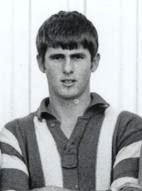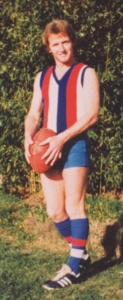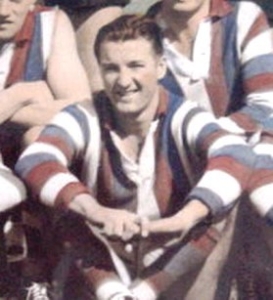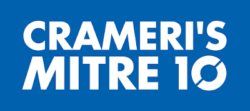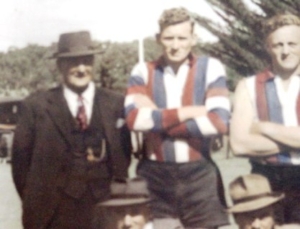
Ken Boots
After finishing on the bottom of the ladder in 1950, Avoca was determined to recruit a top footballer as coach.
They appointed Ken Boots, who had coached Traralgon in the Central Gippsland League for the previous two years.
Twenty eight year old Boots had previously been a star player with Glenelg, South Australia`s best football competition.
He was paid 170 pounds, and employed by the local textile Arts Company in its plastics factory.
Ken, who was a brilliant centre man, quickly reaped dividends.
Besides lifting the team into the four, he was voted the best player and polled in every game to finish with 16 votes in the league award.
He also won the best player award the following year.
Again the team finished in the four, but lost the first semi final by 57 points to Moonambel.
Although Ken relinquished the coaching position to Jock McDougall in 1953, he was persuaded to remain as a player.
For most of the premiership season he played at centre half forward, which allowed another brilliant footballer, Bert Cullen, to take over in the centre.
Ken performed best under pressure, and certainly rose to the occasion in the 1953 Grand Final, where he was instrumental in steering Avoca to an historic eight point victory.
Many who saw him play maintain Ken Boots was one of the best footballers ever recruited by the club.
Brian Coghlan
Brian`s distinguished career started in 1961, aged 14 years, and the following year he played in Avoca`s Reserves Premiership team.
In 1968 he won the Lexton League goal kicking award with 74 goals.
The following year he repeated the feat amidst controversy.
Although Avoca finished in 5th position, Brian`s goal kicking feats during the season were a talking point. In one match he booted 11 goals, one short of the Club record shared by Paddy Ryan Junior (1934) and Ian Grant (1956).
As the end of the season drew near, heavy bets were laid as to whether the 22 year old would reach the magic 100 goals.
The most popular version of the story involves one of the Club`s best and most loyal supporters, Claude Harrison.
Renowned for liking a bet, Claude had every confidence in young Coghlan and invited any doubters to put their money where their mouth was.
Brian was very fond of Claude and would never let him down intentionally.
However, there was another side to this modest young sportsman`s personality. Despite his quite nature he loved nothing better than to play a prank.
Prior to the last game of the season, against Amphitheatre, those who had laid bets all agreed eight goals was required to achieve the magic target.
However, as the match progressed the big full forward seemed to be in no rush, and several times during the game he passed the ball to team mates instead of goaling himself.
Just moments before the siren, and with finger nails being gnawed feverishly, Coghlan, who required just one goal, decided it was time to end the misery, and led for the ball marking 60 metres out right on the boundary.
Just as he was about to take his kick the siren sounded, but pressure and tension were foreign words to Brian Coghlan.
As the natural left footer started his run up towards the man on the mark, he suddenly decided one final prank was in order.
Instead of booting the ball with his left foot, just before his boot made impact with the ball, he switched to his right and, even more alarmingly, elected to use the unconventional drop kick.
The crowd, the footballers, and the punters all gasped and watched dumb-founded as the ball spiralled into the afternoon sunset, splitting the goal posts.
With bets all settled, drinks at the Avoca Hotel were on Claude Harrison, as the town celebrated Brian Coghlan`s century.
To what extent the story has been embellished is debatable, but the fact is that the match was subject to a protest over an alleged mistake by the timekeepers.
After an investigation, the game was replayed. Avoca was defeated, not only costing the team a place in the final series, but also denying Brian Coghlan a strong chance of enhancing his tally.
Ironically, when the official Lexton League record was produce on Grand Final day, Coghlan had been credited with only 99 goals.
To this day the official tally is disputed.
Good judges say Brian Coghlan had VFL potential, but, like so many other country boys, the League talent scouts could not convince him to move to the city.
Coghlan finished his football with Avoca, and certainly deserves the title of Bush hero.
His impressive record includes 404 goals in 11 seasons.
He won the Lexton League Goal Kicking award for Avoca in 1968, and 1969.
On five occasions he topped Avoca`s goal kicking list.
In 1976 he became the first Avoca player to win the prestigious Maffescioni Trophy, a League award then decided by votes of opposing clubs.
He twice won the Avoca Club`s Best and Fairest Player award in 1975 and 1976.
He was selected twice in the Lexton League representative side and was voted best afield in the 1972 team that played Ballarat District.
Despite enormous natural ability, the one thing that eluded him was the honour and satisfaction of playing in a Senior premiership side with Avoca, and that is his only regret.
Gerard Darcy
After a dismal 1977 season, Avoca recruited strongly over the following summer, and amongst the new faces was a young footballer from Donald named Gerard Darcy.
Darc, as he was known to his team mates, came to Avoca with a big reputation to live up to. The Darcy Medal, for the Best Player in the North central League, was named after his father, Des.
Gerard was soon recognised as a fearless rover and nobody was surprised when he won the Most determined Player award at the end of the season.
But the best was yet to come.
In 1979 he played in Avoca`s Runner Up side, and was a member of the 1980 and 1981 `drought breaking` Premiership teams.
He finished the 1979 season with 52 goals, six behind the leader Geoff Drummond.
1981 was an even better season for Gerard, who was voted best player in the finals series and best afield in the Premiership side.
However, 1982 was the year that he individually carved a name for himself in the Club`s history, when he went on a spectacular goal kicking spree.
In one game against Moonambel, he booted an amazing 22 goals to set a club record that may stand forever.
The previous record was 16 goals shared by Jim Jess (1972) and his brother John Jess (1982).
Gerard also kicked individual tallies of 12 goals, nine goals (twice), and seven goals (twice).
He topped the Lexton League goal kicking for the season with 115 goals, which created a new club record for Avoca.
The previous record holders are all remembered as club champions;
1934 – Paddy Ryan Jnr. 59 goals
1953 – Ian Grant 89 goals
1969 – Brian Coghlan 99 goals.
During the five seasons he played with Avoca, Gerard Darcy kicked 274 goals, and was a crucial part of what is now remembered as one of the club`s most successful era`s ever.
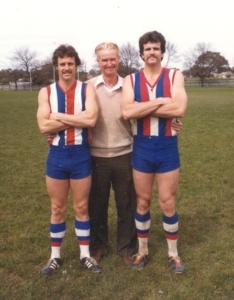
Ron and Wayne Deledio
The arrival of the Deledio Brothers, Ron and Wayne, ushered in an exciting new era for the Avoca club.
In 1978, Ron Deledio, was transferred to the Avoca Branch of the National bank. Ron’s father, Ron Senior, was an outstanding footballer, and as a tribute, the Dunolly oval was named after him.
Ron was only in Avoca five minutes before he was signed up and made assistant coach of the football club.
The following year he was appointed playing coach. It proved to be a fabulous deal for Avoca, Ron’s Wife, Patricia, took on the laborious job of treasurer, whilst Ron’s father accepted a position on the selection committee.
But the bigger coup was the recruitment of Ron’s brother, Wayne Deledio, a former Carlton and Brunswick player. Standing 6 feet, Wayne had a near perfect football physique, complimented by a fierce determination.
Often Wayne would finish a gruelling Sunday morning training session by attacking a punching bag in the clubrooms. Such was the fury, one could not help but feel sorry for the bag!
It was a similar story on the field. Late in a match against Moonambel, Wayne received a fee kick. It was a miserable winter’s afternoon. Continuous rain had saturated the ball and it could barely travel 30 metres.
To everyone’s surprise, Wayne, who was just inside the centre square, prepare to shoot for goal, a near impossible task even in excellent conditions. As Wayne started his run up, a spectator bellowed, “You can’t kick that, Deledio,” Stopping abruptly, he glared defiantly towards the voice. With total composure Wayne carefully wiped the waterlogged ball on his guernsey, telegraphing his intentions beyond any doubt.
An eerie silence engulfed the fround. Slowly he ran towards the man on his mark. The sound of his boot making contact with the ball was reminiscent of a huge stock whip being cracked. The ball as heavy as a lump of lead, took off like a jumbo jet. As it reached its peak, it seemed to hang momentarily in the dark winter sky before gliding down over the heads of the dumbfounded players standing in the goal square.
Those who witnessed that goal say it is something that they will remember for a lifetime.
In his first season with the Bulldogs, 1979, Wayne Deledio streaked away to win the Lexton League Best & Fairest award by 14 votes. With a massive 35 votes he blitzed the field in the Maffescioni Award with a margin of 16 votes. Wayne also won Avoca’s Best player award, the club goalkicking award, and was selected in the Lexton League side.
1980 was an even better season. His achievements included another Lexton League Best & Fairest award with 23 votes, the Maffescioni Award with 33 votes, the Avoca club Best & Fairest and a best on the ground performance for the Lexton League against the Western Plains League.
Personal achievments aside, the Deledio brothers effectively carved their names into the history of the Avoca Football Club in 1980, when they led the Bulldogs to their first premiership in 27 long years.
But the accolades do not end there, Ron coached the side again in 1981 and has the great distinction of being only the second man ever to captain and coach Avoca in Back to Back premierships. The other was Paddy Ryan in 1927 and 1928.
The League acknowledged Ron Deledio by appointing him coach of its representative side in 1981.
Footnote: Ron Deledio was also an outstanding athlete, having the distinction of winning the prestigious Maryborough Gift and in doing so shared the honor roll with his father, Ron Senior, who also won the Maryborough Gift some years before.
As well as being a great athlete, Ron Deledio was also an oustanding clubman who was always first in to lend a hand when something needed doing, and played a major role in the recruitment of players to the club. The Deledio Family has definitely played a major role in one of the clubs most succesfull era’s of its 132 year history..
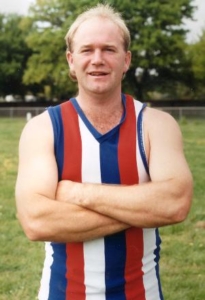
David Edwards
The remarkable career of David Edwards commenced on 17 April 1975, 10 weeks before his eleventh birthday.
Needless to say, he won the award for the Best Player Under 13, which was the first of a string of awards, and the beginning of a story of triumph and tragedy.
He won the Under 13 Best Player award again in 1976 and, after playing in consecutive runner up sides, was a member of the 1977 under 15`s Premiership team.
The following year he snared his first major award, the Lexton League Under 15 Best Player, winning by just one vote from his team mate Greg Jess.
In 1979 he played in Avoca`s Reserve grade premiership team and at the age of 16 was one of the best players in Avoca seniors` `drought breaking` Premiership side.
1981 was another memorable year for David. He played in back to back Premierships, and during the season booted four goals in a best afield performance for the Lexton League team.
He capped of a great year by winning Avoca`s Best & Fairest award with 42 votes. All this, and still only 17 years old.
From a personal view point, 1982 was an even better season.
Again he was selected in the Lexton League Side, and in the Club Best & fairest award he streaked away to win with a massive 63 votes, twice as many as the second place getter.
He also won the prestigious Maffescioni Award which decides the best player in the competition according to club votes.
David played most of the 1983 season with Beaufort, but returned to Avoca in 1984 and promptly took out the club`s big double, the Best & Fairest award and the Goal Kicking trophy with 51 goals.
Again he left Avoca and played 1986 and 1987 seasons with Maryborough Rovers, where he was an outstanding success, winning consecutive Best & Fairest awards.
For a third time he returned home to Avoca and again stormed away to win the Best & Fairest trophy in 1988 with 52 votes.
In 1989 he re-wrote the club`s record books by winning the Best & Fairest award for a fifth time with a massive 55 votes.
He finished third in the League`s top player award, just 5 votes of the pace, and was second in the Maffescioni award, three votes behind the winner.
David was just 25 years of age when he suffered a serious knee injury against Marnoo at the start of the 1990 season.
Although he did not play again until the following year, he appeared to recover and finished third in the club`s Best & Fairest award, behind Shane Jackson and Brendan Jolly.
In 1992 he played one game on permit with Donald, but injured his knee again and sadly retired at the relatively young age of 27.
David`s enviable record with Avoca includes;
Seven Senior Best & Fairest Awards. (Club Record)
Five Premierships (Three Senior, one Reserves & Under 15)
Club Senior Goal Kicking Award.
Maffescioni Award.
Lexton League Under 15 Best & Fairest.
Leaxton league Senior Best & Fairest.
Whilst most footballers would envy his achievements, there is a school of thought that suggests David had the ability and potential to reach even greater heights.
Typically David has again confounded the local football fraternity by making a gutsy comeback in 1993.
*Footnote: After making his comeback, David Edwards played brilliant football in the final series and was judged the best player of the Second Semi and Preliminary finals as well as also being the best player of the winning 1993 Grand Final side.
He also won the Lexton Football League Best & Fairest in 1993 as well as winning the club Best & Fairest in 1993 and again in 1994, which was the seventh time he won the Avoca FC Best & Fairest at senior level.
A True Legend of the Avoca FC!
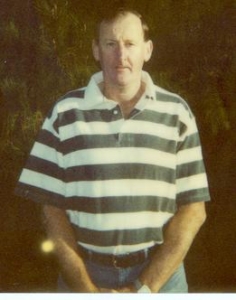
Ron Field
Remarkably, at the age of only 15, 16 and 17, Ron Field was voted Best Player Under 20 years.
He was just 17 years old when he won Avoca`s Best & Fairest award in 1961.
Ron was cleared to Charlton in 1962, but returned to Avoca the following year and again won the club`s Best & Fairest award and was best player afield for the Lexton League team.
VFL club, St Kilda tried to entice him to Melbourne, but in 1964 Ron joined Maryborough and soon established a reputation as one of the best centre half backs in the Ballarat League.
In 1971 he won the Best & Fairest award for the North Central League.
Ron returned to Avoca in 1977 and again won the club`s top individual award, and capped of a brilliant career by repeating the effort in 1978.
In 1970, Navarre and Lexton League President, the late Ray Bibby, was asked to name Avoca`s best footballer ever.
Bibby, considered a shrewd judge, did not hesitate in nominating Ron Field.
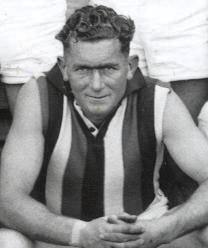
Bill Gollop first played with Avoca as a teenager in 1946.
That year he was selected in a forward pocket for the First semi Final, which Avoca lost to Moonambel by 21 points.
The following year he played on permit with Maryborough.
Bill returned to Avoca and, as he filled out, he developed a reputation as one of the best big men in the Lexton League.
Renowned as a tireless ruckman, he was often switched to centre half forward to bolster Avoca’s attack.
Bill was one of the best players in the historic 1953 premiership team.
In 1955 he shared Avoca`s best player award with Mike Cleary and was third in the League count with 18 votes.
The following year he easily won the club award with 52 votes.
Bill was captain and Coach of Avoca from 1956 until 1959.
In 1958, aged 34 years, he polled 18 votes to finish third in the Lexton League Best Player award, but took out the club equivalent.
When the reserves competition was formed in 1960, Bill Gollop was Avoca`s first coach.
He was honoured with Life membership in 1960.
As a footballer who devoted most of his life to Avoca, Bill Gollop`s long and distinguished career remains a fine example to all.
Ian Grant
Aged just 23 years, Ian Grant cemented his name in the history of the Avoca Football Club by booting a record eight goals and being best afield in the 1953 premiership team.
Although he stood just 5 feet 10 inches, ian was an exciting and gifted full forward, renowned for his marking.
He had perfected the ability to launch himself high into the air by taking just a few steps and firmly planting his feet into the shoulders of an opponent.
He won the League goal kicking in 1953 (89 goals) and 1956 (80 goals).
For six consecutive years he topped the goalkicking for Avoca, a feat eclipsed only by Paddy Ryan junior, who won the award seven times.
Records also show that he booted tallies of 10,11 and 12 goals in individual games.
In 1955 he was appointed coach, and Avoca was unlucky in finishing fifth on the ladder.
Once again he played for the Lexton League in the Beaurapaire Shield. Lexton thrashed Clunes by 91 points. Ian booted six goals and was one of the best players.
His illustrious career with Avoca ended at the end of the 1958 season.
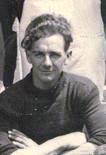
Bill Harris commenced playing football for Avoca in 1921, after the First World War.
Although club records are sparse, in 1993 another former Avoca champion, Allan Kaye, was able to provide ample background to reveal much of the lost years.
Allan went to school with Bill and his wife, then Peggy Brereton.
Both Peggy and Bill were two of the best all round sports in the district.
`Peggy was a champion tennis player`, said Allan.
He added, `We called Bill `Noisy`, because he was good at everything and, by God, he let you know it`.
In 1922 young Bill Harris was an enthusiastic member of the football committee, and from 1923 hardly a game was played without Bill Harris being amongst the best.
He was instrumental in Avoca`s one point victory over Natte Yallock to win the 1923 Premiership.
Although Avoca lost the 1924 Grand Final to Lexton, Bill was amongst the best players.
His football career was interrupted in 1925, when he worked on the Open Cut mine at Yallourn.
Again in 1926 he was a top player for Avoca, and was simply sensational in 1927.
When the Bulldogs thrashed Barkly by 70 points in the 1927 Grand Final, Bill, the Vice Captain, was best a field.
In 1928 he was appointed captain & coach, but work commitments mid-season forced him to hand the responsibility to Paddy Ryan.
However, it not prevent him from playing a vital role in the 1928 and 1929 Premierships.
When he stopped playing football in 1935, he concentrated on golf.
Until the day he died, Bill Harris continued to play his golf like he played football, fiercely competitive and extremely proud of it.
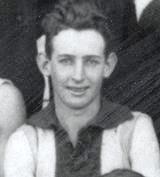
Erroll Howell
Right from his first game on 18May 1927, Erroll Howell was destined to be a very good footballer.
Avoca had a strong side and it was up to the teenager to prove himself, if he was to maintain his position.
Throughout the season Erroll was always amongst the best players.
It was a memorable year for Avoca. Besides winning the premiership, several records were also broken.
It was a similar story in 1928, with the club winning back to back premierships in defeating Redbank by 15 points.
Again Erroll Howell was one of the best players.
Sadly, club records were not kept in 1929, but Avoca were again Premiers, and presumably Erroll was prominent.
In a controversial match against Burrumbeet on 30th August 1930, Erroll booted seven goals to equal the club record set the previous year by Alf Goonan.
There were allegations the game was fixed, thus allowing Avoca to scrape into the four on percentage.
On 18th April 1931, the Avoca newspaper revealed that Amphitheatre had tried to recruit Erroll Howell and had applied for a clearance.
The Avoca club strongly opposed the move and Erroll was appointed captain at the age of 22.
He relinquished the position to Charlie Pollinelli in 1932, but led Avoca again as captain and coach from 1933 until 1936.
On 23rd May 1934, Erroll booted seven goals against Elmhurst to again equal the club record shared with Alf Goonan four years earlier.
When Erroll kicked his 200th goal for Avoca on 4th July 1934, another local identity was making sporting news in England. Hans Ebeling, who was touring with the Australian cricket team, had the bowling figures of five for 28.
In 1935 Erroll was selected in the centre for the Pyrenees League and was one of the best players.
Later in the season he led Avoca to its sixth premiership.
In 1936 Avoca was ripped apart by the Lamplough Miners Football Club row, but still played off in the Grand Final losing to Redbank by 26 points.
At the end of the season Erroll received a special trophy to acknowledge eight years of outstanding service.
In 1937, aged 29 years, Erroll had the honour of being appointed captain and Coach of the Pyrenees league, and also played in Avoca`s Premiership side.
Standing only five feet 10 inches, and weighing 12 stone, Erroll Howell will always be remembered as one of Avoca`s best footballers, and was a significant part of its most successful era ever, which included five premierships.
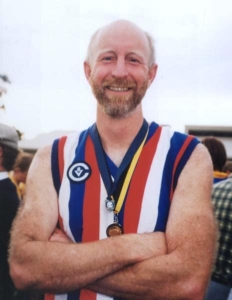
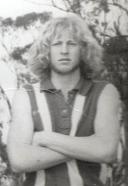
Jim Jess
Jim Jess is the most distinguished footballer ever to come out of Avoca. Along with the great Colin Niven, who played with Natte Yallock, and later Fitzroy and Melbourne, Jess will always be remembered as a local product who went on to become a champion in the best competition in Australia.
The rugged big man played in Richmond`s 1980 Premiership team. He was picked to represent Victoria on five occasions and arguably his greatest accolade was selection in the 1980 All Australian team.
Ironically, his league career went precariously close to ending before it started.
Whilst he dreamed of making the big league, like many country boys he loved his life in the bush, and was suspicious and frightened of the city.
A confident lad, but out of his environment he was shy.
In his teens Jim had shown outstanding potential, and caught the eye of most VFL talent scouts, although he was zoned to St Kilda.
Soon a deputation from St Kilda, full of its own importance, tracked down young Jess. After spruiking for an hour about the virtues of playing with the Saints and living in the big smoke, they were puzzled by the boy`s reluctance.
`Well son, you know where to find us,` said one of the officials. `If you change your mind and want to give it a go, come and see us.` That man was responsible for one of the worst recruiting blunders ever.
It seemed no time after the Saints Ford fairlane had pulled out of sight, and the dust had settled, that officials from Carlton arrived in their BMW.
The Blues certainly talked a more enticing language, Money, a car, a job, nothing seemed a problem, But, like the Saints, the men from Carlton were surprised by the lack of interest.
It seemed there was no way this kid could be enticed to Melbourne.
By now Jim was playing with St Arnaud.
Patiently watching his rapid progress was Paddy Guinane.
The former Richmond champion had served his apprenticeship under the prince of recruitment officers, the great Graeme Richmond. Paddy had inherited a unique shrewdness and developed the art of winning the confidence of young bush talent.
Paddy made an effort to get to know Jim, his father and his family.
Gradually Paddy became a trusted friend, and it was just a matter of time before he would utter the magic words, “Son, if you’re sure you want to play league football, you come down to Richmond with me, and we’ll really look after you.
Those reassuring words won Jim Jess`s confidence, and thus launched what would prove to be an exciting and memorable league career.
Footnote: This above extract was taken from Bush Heroes during the 1993 season.
Jim Jess coached Avoca to the 1993 Premiership after this book had been published.
Unfortunately though, Jim could not play in the Grand Final after suffering a knee injury in the 2nd semi final.
Jim won the 93 L.F.L Goalkicking Award with 103 goals and was also runner up in the club Best & Fairest award. He kicked 20 goals in one game vs Landsborough.
He coached Avoca in 94 and played in the Grand Final, but unfortunately our arch rivals from down the road, Natte extracted revenge from the previous season.
Jim won the Avoca Best & Fairest award in 1996, which is 24 years since he had previously won the same award in 1972 as a 17 year old boy.
He was Runner up in the L.F.L Best & Fairest award and also the Maffescioni Award and at long last, finally achieved his ambition to play in a premiership with the Avoca Football Club. He also coached the Lexton Football League.
Jim would play in premierships for Avoca in 1997 and 1998 and was judged to be the winner of the VCFL medal for the best player in the Grand Final in 1997.
Jim finally hung up his boots after the 1999 season, but did play a couple of games for Robe FC in 2003 when he coached that club to a Premiership after being wooden spooners the previous season.
In 1997, Jim Jess was presented Life Membership of the Avoca Football & Netball Club.
Jim Jess Honour Roll
1968 – Winner of Under 15 Club Best & Fairest.
1971 – Played in Senior Runner Up Side. 16 year old.
1972 – Winner of Club Best & Fairest.
– Winner of Best Under 20 and Best Under 18 club awards.
– Played in Senior Runner Up Side.
– Kicked a club record of 16 goals vs Amphitheatre.
– His bother, John Jess equalled this record with 16 goals vs Moonambel in 1982.
1973 – Cleared to St Arnaud FC.
1975 – Winner of North Central FL Best & Fairest Award.
Went on to play 223 games with Richmond FC, 1980 Premiership, represented Victoria on 5 occasions, and 1980 All Australian Rep.
Coached Balranald FC to premierships and then played with former Richmond team mate, Mark Lee, who coached Burnie Tigers FC to a premiership in 1992 and Jim then returned to Avoca in 1993.
1993 – Coach of Premiership side.
– Winner of LFL Goalkicking award with 103 goals.
1994 – Senior Coach.
1995 – Played with Port Fairy FC.
1996 – Winner of Avoca Club Best & Fairest Award.
– Runner Up in LFL Best & Fairest Award.
– Played in 1996 Premiership.
– Coach of LFL Team.
1997 – Played in 1997 Premiership.
– Winner of Mervyn Howard Memorial Medal for VCFL Best in Grand Final.
– Presented with Life Membership of Avoca FNC.
1998 – Played in 1998 Premiership.
1999 – Retired at end of season.
2003 – Coached Robe to Premiership.
Terry Long
After a long distinguished career with Maryborough, in the Ballarat League, Terry Long was enticed to coach Avoca in 1970.
It was considered a recruiting coup.
Despite his lack of height, 5 feet 10 inches, and weighing only 12 stone, Terry had earned a reputation with Maryborough as a brilliant centre half forward, although with Avoca he played mainly in the centre.
The words `giving up` were not part of his vocabulary.
In 1971 and 1972 he led Avoca into the Grand Final, but on both occasions the team was defeated by Lexton.
He stood down as coach in 1973, but remained as a player to help the club.
For the next three seasons he won the club`s Best & Fairest award.
In 1975, his final year with Avoca, he also won the prestigious Monier Award.
Sadly, he was just one vote short of winning the Lexton League Best & Fairest, which would have been a fitting finale to a brilliant career.
On and off the field, Terry Long was an inspiration, and as long as there is a football club at Avoca Terry will always be welcome, and recognised as one of its champions… a classic example of the real Bush Hero.
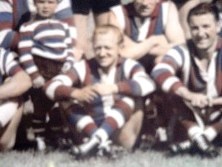
Jock McDougall
Being captain and coach of a Premiership side is justification enough to be recognised as one of the club`s all time champions.
However, Jock McDougall also earned the title as a brilliant and courageous rover.
In his first game with Avoca he booted five goals, and finished the season with 65.
In the preliminary final against Navarre, Jock kicked four goals and was best a field.
He booted five goals in the 1953 Grand Final, and was named amongst the best players.
For most of the following year he was sidelined, but gave the club another season of good football in 1955.
Recently whilst walking in the streets of Richmond, Jock was surprised to be recognised.
When he was told he was still regarded as one of the club`s all time champions he was deeply moved.
Like many people, the 1953 Premiership will always be something very special for this modest Bush Hero.
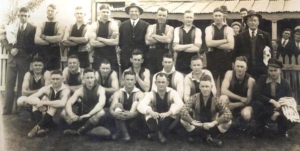
Paddy Ryan Junior
1932, at the age of 15.
Although he was a slightly built teenager, Paddy had incredible stamina and, consequently, his first years of football were played on the ball as a rover.
In just his second season of football, and aged 16, paddy was starring in most games.
On 20 June 1933 he gave notice of things to come when he booted six goals in a best a field performance against Elmhurst.
Later that season in the first semi final, again against Elmhurst, he kicked five goals.
Paddy, who was the son of the local policeman, Paddy Ryan Senior, was becoming a nightmare for Elmhurst and on 27 June 1934 kicked nine goals, creating a new club record.
Although he was only five feet nine inches and 11 stone, Paddy was proving to be a sensation on the forward line.
The goal kicking spree against Elmhurst continued on 1st August 1934, when he reset his own club record with 12 goals.
Despite his size, Paddy was selected at full forward in the 1935 Pyrenees League team.
He also played at full forward in Avoca`s 1935 Premiership side, kicking six goals.
Again in 1936, 1937 and 1939 he was picked as a key forward in the strong Pyrenees League sides.
Playing in a semi final against Lexton on 9th September 1936, Paddy booted 10 of Avoca`s 14 goals, a League record which still stands today.
In 1936, he tied for the club`s best player award with Claude Cunningham.
During the 1937 final series Paddy kicked a tally of 16 goals, including a match-winning six goals against Lexton, to win the Grand Final by 10 points.
Again in 1938 he was setting records when he booted 10 goals in the Preliminary Final against Natte Yallock.
Pound for pound, Paddy Ryan Junior was widely regarded as the most amazing footballer ever to play for Avoca.
When the club disbanded at the end of the 1940 season because of the war, Paddy Ryan`s remarkable career with Avoca also ended and he was still only 23 years of age.
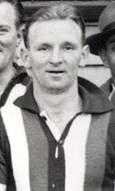
Alan Streeter
Avoca`s 1953 Premiership victory is one of two highlights experienced by the club in the 1950`s.
The second memorable achievement occurred in 1957, when Alan Streeter won the Lexton League Best & fairest, becoming the first Avoca player to do so.
At the age of 18, Alan joined VFL club Carlton, where he played 45 games in three seasons.
He transferred to Oakleigh in the VFA, winning the club Best Player award and playing in the 1952 Premiership team.
He then played with Donald and Charlton in the North central League before joining Avoca as captain coach in 1956.
The following year Bill Gollop was appointed coach, but Alan, who worked at the Avoca timber mill, remained on as a player.
Without the responsibility of coach, he was simply sensational, either as a rover or centre man.
In the League Best & Fairest award he received umpires votes in 14 matches for a total of 29 and a half, 12 and a half votes more than his nearest rival.
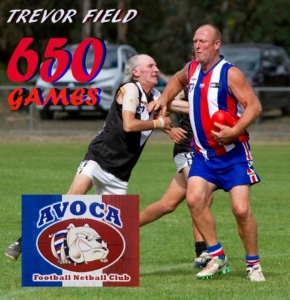
Trevor Field is a club legend who has played over 650 games for the Avoca FNC.
Trevor commenced playing with Avoca way back in 1982 with the Under 16 team and received the Best Under 13 player of that year. This was to be the start of an illustrious career with our club and thirty eight years later he is still going strong.
Trevor has been an outstanding contributor to the Avoca Bulldogs, both on the field and off the field. He can often be seen helping the juniors doing the tasks that a lot of people will not do. He has done the umpiring in all descriptions, Field, Goal or Boundary and will do the Running or wear the famous pink shirt of the Water Boy.
Then he dons the Guernsey and runs out to play in the Reserves these days and is still going strong.
Trevor has won numerous individual awards and also played in a number of premierships over the thirty six year journey.
He has won seven club Best & Fairest awards and been Runner Up on five occasions.
He has won two League Best & Fairest Awards. The Lexton Plains Senior Best & Fairest Award in 2001 and the MCDFNL Reserves Best & Fairest award in 2010.
He received the Peter Gellert Award in 1992 and the Maffescioni award in 2002 which were Lexton FL and Lexton Plains FL awards in which the opposition clubs vote on the best player.
He has also been selected to represent the LFL and LPFL on seven occasions.
Trevor played in four Senior Premierships in 1993, 96, 97 & 98 during the very successful 90’s era of the Avoca Bulldogs.
Trevor is held in high regard by everyone at the Avoca Football Netball Club and was awarded Life Membership in 2002 when he played his 300th game for the club. (We may have to give him another one as he has met the criteria twice.)
We congratulate Trevor and thank him for his ongoing service to our club.
Well done Baz!
Trevor Field Record can be seen at this link.
https://websites.sportstg.com/get_file.cgi?id=36751832
Trevor Field PDF version of this story.
https://websites.sportstg.com/get_file.cgi?id=36751828
Trevor Field Legends-converted.pdf

